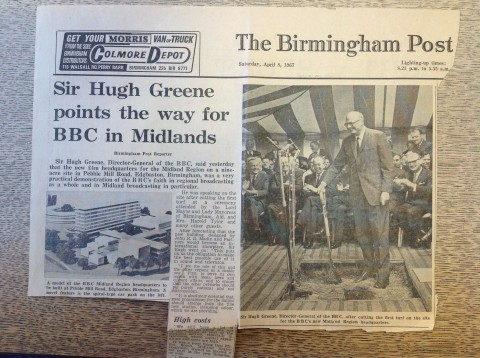The following is an excerpt from a letter sent by Patrick Beech, the Controller of the Midland Region, to Sir Hugh Greene, the Director General of the BBC, in March 1967. The letter discusses the press release speech that Patrick Beech was writing, to be delivered by Sir Hugh Greene, at the cutting of the first sod ceremony, for the building of Pebble Mill, on 7th April 1967. Patrick Beech was using the speech to negotiate an increase in BBC Birmingham’s power, and ability to “sign the cheques”! He cleverly added his own thoughts and opinions into the section of the speech looking into the future of Pebble Mill. It is perhaps down to Patrick Beech that Pebble Mill became a lot more than “a warehouse for London”.
“[I] enclose some ideas for 7th April for you to play around with. The “Past and Present” section is factual; the “Future” is strongly fringed with my own beliefs, which you may or may not agree with! I could, of course, have put it in a much more emphatic way, but have tried to leave it in such a way that you were not over-committed.
There is, of course, little argument about the regional position in radio, but in television – which the journalistic job is accepted – there are divergences of opinion about the extent to which we should do programmes “across the board”. I personally am convinced that we must, and, moreover, that we should be in the same editorial position in Television as we are in radio. If we can’t take the decisions – which means signing the cheques – here in Birmingham we shall be building no more than a warehouse for London at Pebble Mill. It will be a body without a heart.”
Patrick Beech
I found the original letter in a file about Pebble Mill held at the BBC Archives at Caversham. The file did not seem to have been viewed by anyone else, since it was lodged in the BBC Archives.

